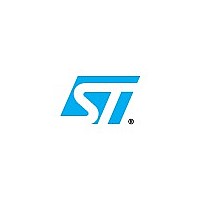ST72325S6 STMicroelectronics, ST72325S6 Datasheet - Page 47

ST72325S6
Manufacturer Part Number
ST72325S6
Description
8-bit MCU
Manufacturer
STMicroelectronics
Datasheet
1.ST72325K4.pdf
(197 pages)
Specifications of ST72325S6
Hdflash Endurance
100 cycles, data retention
Clock Sources
crystal/ceramic resonator oscillators, internal RC oscillator and bypass for external clock
Four Power Saving Modes
Halt, Active-Halt,Wait and Slow
Main Clock Controller With
Real time base, Beep and Clock-out capabilities
Two 16-bit Timers With
2 input captures, 2 output compares, external clock input on one timer, PWM and pulse generator modes
8-bit Pwm Auto-reload Timer With
2 input captures, 4 PWM outputs, output compare and time base interrupt, external clock with event detector
- Current page: 47 of 197
- Download datasheet (4Mb)
POWER SAVING MODES (Cont’d)
8.4 ACTIVE-HALT AND HALT MODES
ACTIVE-HALT and HALT modes are the two low-
est power consumption modes of the MCU. They
are both entered by executing the ‘HALT’ instruc-
tion. The decision to enter either in ACTIVE-HALT
or HALT mode is given by the MCC/RTC interrupt
enable flag (OIE bit in MCCSR register).
8.4.1 ACTIVE-HALT MODE
ACTIVE-HALT mode is the lowest power con-
sumption mode of the MCU with a real time clock
available. It is entered by executing the ‘HALT’ in-
struction when the OIE bit of the Main Clock Con-
troller Status register (MCCSR) is set (see
10.2 on page 61
register).
The MCU can exit ACTIVE-HALT mode on recep-
tion of an external interrupt, MCC/RTC interrupt or
a RESET. When exiting ACTIVE-HALT mode by
means of an interrupt, no 256 or 4096 CPU cycle
delay occurs. The CPU resumes operation by
servicing the interrupt or by fetching the reset vec-
tor which woke it up (see
When entering ACTIVE-HALT mode, the I[1:0] bits
in the CC register are forced to ‘10b’ to enable in-
terrupts. Therefore, if an interrupt is pending, the
MCU wakes up immediately.
In ACTIVE-HALT mode, only the main oscillator
and its associated counter (MCC/RTC) are run-
ning to keep a wake-up time base. All other periph-
erals are not clocked except those which get their
clock supply from another clock generator (such
as external or auxiliary oscillator).
The safeguard against staying locked in ACTIVE-
HALT mode is provided by the oscillator interrupt.
Note: As soon as the interrupt capability of one of
the oscillators is selected (MCCSR.OIE bit set),
entering ACTIVE-HALT mode while the Watchdog
is active does not generate a RESET.
This means that the device cannot spend more
than a defined delay in this power saving mode.
CAUTION: When exiting ACTIVE-HALT mode fol-
lowing an MCC/RTC interrupt, OIE bit of MCCSR
register must not be cleared before t
MCCSR
OIE bit
0
1
HALT mode
ACTIVE-HALT mode
Power Saving Mode entered when HALT
for more details on the MCCSR
instruction is executed
Figure
30).
DELAY
section
after
the interrupt occurs (t
lay depending on option byte). Otherwise, the ST7
enters HALT mode for the remaining t
od.
Figure 29. ACTIVE-HALT Timing Overview
Figure 30. ACTIVE-HALT Mode Flow-chart
Notes:
1. This delay occurs only if the MCU exits ACTIVE-
HALT mode by means of a RESET.
2. Peripheral clocked with an external clock source
can still be active.
3. Before servicing an interrupt, the CC register is
pushed on the stack. The I[1:0] bits of the CC reg-
ister are set to the current software priority level of
the interrupt routine and restored when the CC
register is popped.
[MCCSR.OIE=1]
INSTRUCTION
RUN
HALT INSTRUCTION
N
(MCCSR.OIE=1)
HALT
ACTIVE
INTERRUPT
HALT
Y
256 OR 4096 CPU
CYCLE DELAY
INTERRUPT
DELAY
RESET
OR
256 OR 4096 CPU CLOCK
OR SERVICE INTERRUPT
FETCH RESET VECTOR
OSCILLATOR
PERIPHERALS
CPU
I[1:0] BITS
OSCILLATOR
PERIPHERALS
CPU
I[1:0] BITS
OSCILLATOR
PERIPHERALS
CPU
I[1:0] BITS
N
= 256 or 4096 t
CYCLE DELAY
RESET
Y
1)
VECTOR
FETCH
ST72325xx
2)
DELAY
RUN
XX
XX
OFF
OFF
OFF
ON
ON
ON
ON
ON
ON
10
CPU
3)
3)
47/197
peri-
de-
Related parts for ST72325S6
Image
Part Number
Description
Manufacturer
Datasheet
Request
R

Part Number:
Description:
STMicroelectronics [RIPPLE-CARRY BINARY COUNTER/DIVIDERS]
Manufacturer:
STMicroelectronics
Datasheet:

Part Number:
Description:
STMicroelectronics [LIQUID-CRYSTAL DISPLAY DRIVERS]
Manufacturer:
STMicroelectronics
Datasheet:

Part Number:
Description:
BOARD EVAL FOR MEMS SENSORS
Manufacturer:
STMicroelectronics
Datasheet:

Part Number:
Description:
NPN TRANSISTOR POWER MODULE
Manufacturer:
STMicroelectronics
Datasheet:

Part Number:
Description:
TURBOSWITCH ULTRA-FAST HIGH VOLTAGE DIODE
Manufacturer:
STMicroelectronics
Datasheet:

Part Number:
Description:
Manufacturer:
STMicroelectronics
Datasheet:

Part Number:
Description:
DIODE / SCR MODULE
Manufacturer:
STMicroelectronics
Datasheet:

Part Number:
Description:
DIODE / SCR MODULE
Manufacturer:
STMicroelectronics
Datasheet:

Part Number:
Description:
Search -----> STE16N100
Manufacturer:
STMicroelectronics
Datasheet:

Part Number:
Description:
Search ---> STE53NA50
Manufacturer:
STMicroelectronics
Datasheet:

Part Number:
Description:
NPN Transistor Power Module
Manufacturer:
STMicroelectronics
Datasheet:

Part Number:
Description:
DIODE / SCR MODULE
Manufacturer:
STMicroelectronics
Datasheet:










